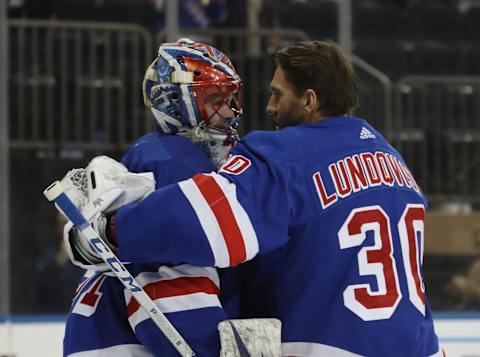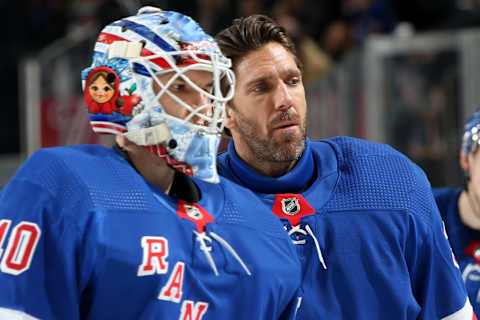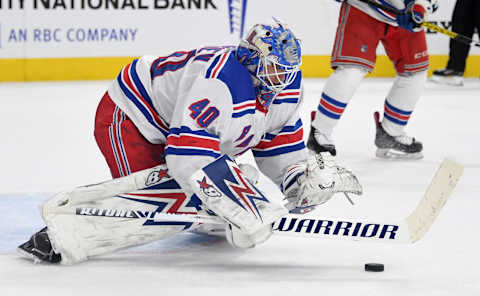How the New York Rangers should resolve the three-headed goalie monster


With the trade deadline on Monday, February 24th, New York Rangers fans should hope for this solution to the current goalie logjam.
The New York Rangers are at the most delicate position they’ve been in as a franchise since The Letter was sent. The rebuild/build has meant saying goodbye to some fan favorites like Mats Zuccarello and Derek Stepan.
But it’s never challenged our fandom and self-appointed general manager skills quite like it has this year. And it’s all because of the three-headed goalie monster.
Granted, this mess is a situation wholly created by the Rangers themselves. First, they knew that Igor Shesterkin was only going to be amenable to plying his craft in the AHL for so long. His KHL opt-out clause loomed large over the future of the franchise while he had a .934 save percentage with a microscopic 1.90 goals against average on his way to 17 wins for Hartford.
And all the while in the NHL Alexandar Georgiev was well on his way to blowing past the 60-game threshold that no longer made him waiver exempt.
Which leads to the most difficult decision they’ve had to make in years: What to do about Henrik Lundqvist, the face of the franchise? (Or as Larry Brooks of the New York Post put it, the Henrik Lundqvist mess.)
So what is the path forward that ends the three-headed goalie monster? Here’s the best-case scenario.

Henrik Lundqvist and the Rangers part ways—but how?
Let’s be very clear: Henrik Lundqvist is easily a top-five Ranger of all time. His 459 career win and 64 shutout totals are all-time franchise leads by sizable margins.
If anyone deserves to choose their fate, it’s Lundqvist. He’s a special player, and with special players you make exceptions. When Derek Jeter of the New York Yankees was playing his last few seasons, his range at shortstop had decreased tremendously. However, he was the New York Yankees for so long, you forgave it. You understood it slightly set back the team in the short term, but you had to honor all he did throughout the long term.
Lundqvist is no different. He’s still a capable NHL goaltender, but he’s not the same player he once was. However, if he wants to remain a lifelong New York Ranger, he’s earned that.
Unfortunately, it may no longer be in the cards. With only four starts in 2020, he’s no longer seeing much action. When he has—with the exception of the shutout against the Detroit Red Wings—he hasn’t been sharp. His three starts against the Calgary Flames, St. Louis Blues, and Dallas Stars all saw him with a save percentage of less than .870.
So, Lundqvist obviously sees his career is at a crossroads. He may choose to retire at the end of this year. Or he may be willing to waive his no-movement clause to chase a Cup.
The Rangers also have an option: They can buy out his contract. (They shouldn’t. This would create more dead cap space in 2020-2021 and 2021-2022.)
Lundqvist’s future plans most likely will be revealed over the next few days. Ideally, he will either agree to a trade or retire at the end of this season.

Alexandar Georgiev’s role moving forward becomes clear.
As in, Alexandar Georgiev role moving forward for the New York Rangers is trade chip.
Right now, Georgiev possesses a career .914 save percentage in 71 games. That’s nice, no question. But we’re in a seller’s market that saw the Los Angeles Kings trade goaltender Jack Campbell and forward Kyle Clifford to the Toronto Maple Leafs for forward Trevor Moore, a 2020 third-round pick, and a conditional 2021 third-round pick that can become a second-round pick.
For context, Campbell’s career save percentage is .918—better than Georgiev’s.
And let’s not forget backup goaltenders of New York Rangers’ past. Cam Talbot‘s save percentage in New York was .933 in 57 games, while Anti Raanta‘s was .921 in 55 games. Both had numbers indicative of starting goaltenders, while Georgiev doesn’t. Georgiev is young, yes, but there’s no guarantee he becomes a team’s top goaltender.
What the Rangers have in Georgiev is a nice backup. With this in mind, does Shesterkin—in a ridiculously small sample size—look like the type of NHL goaltender that you’re going to have a 1A/1B situation with? Highly doubtful. You need someone to back him up 20 games next season.
So if there’s a team at the deadline or at the 2020 NHL Draft that wants to take a chance on Georgiev blossoming into a starting goalie or shore up their backup goaltending, the Rangers need to take that deal.
In a rebuild/build, the assets they get back are vital to the future. Remember, Adam Fox was acquired for two second-round draft picks. Jacob Trouba, who’s being deployed as a top defender, cost the Rangers a late first-round draft pick and Neal Pionk. (In other words, not a lot. Admittedly, Pionk is having a fine season on an offensively loaded Winnipeg Jets.)
Let’s not forget the Rangers have Adam Huska, Tyler Wall, and Olof Lindbom. Of the three, only Wall is currently having a strong season. But none have worked extensively yet with Benoit Allaire, the Rangers goalie coach guru who turned an undrafted free agent (Talbot) and a discarded backup goalie (Raanta) into starting goaltenders in the league.
Georgiev is expendable. A Georgiev trade would be similar to the recent Joey Keane-for-Julien Gauthier trade.
It is a straight player-for-player swap between two teams who were looking to improve certain areas of their depth chart. –Andrew Steele-Davis
So if Lundqvist doesn’t agree to a trade, the Rangers must move Georgiev. If Lundqvist moves on from the only franchise he’s ever known, the Rangers still should trade Georgiev. You don’t hold onto backups that can fetch you a good return unless you’re currently chasing a Cup.
Ultimately, the dream scenario is for the three-headed goalie monster to lose two heads.
Related Story. Chris Kreider and the Aroldis Chapman scenario. light